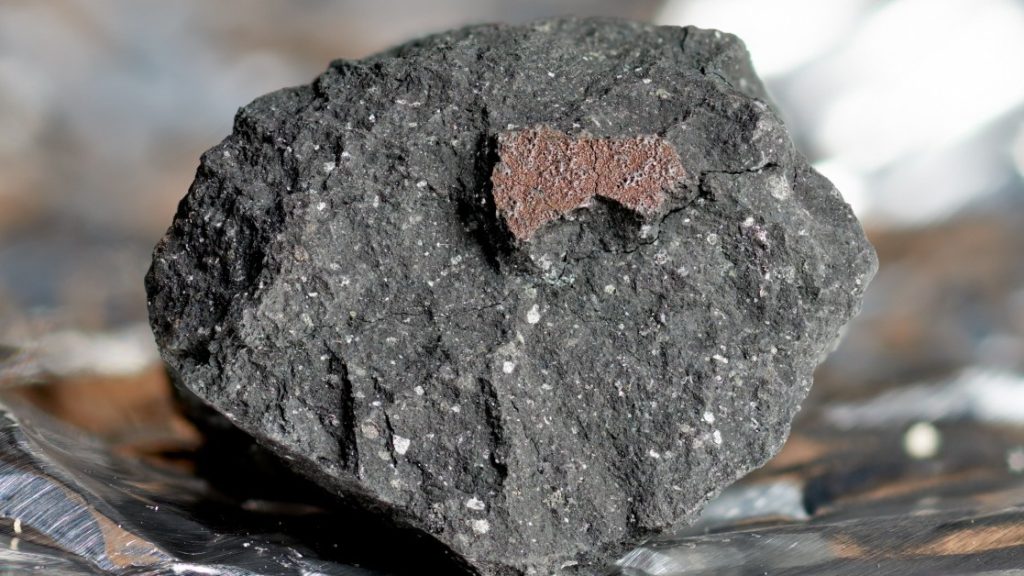It was a stroke of luck in the literal sense: In early 2021, a meteorite fell on a garage driveway in Winkcombe, England, and it was found within a very short period of time, that is, before its chemical composition changed dramatically. The piece and its fragments have now been analysed: among other things, scientists have found water whose chemical signature is most similar to that of terrestrial waters. Therefore, the results support the researchers in the journal Science advances Report a theory about how water once reached Earth: namely, through meteor impacts from space.
Meteorites can provide scientists with valuable information about the young solar system. The problem: After the collision, ground effects quickly shift the stones out of space and thus blur the tracks. In 2021, something special happened: On February 28th at 9:54pm local time, a bright star moved across the sky over the county of Gloucestershire in southwest England. The tracking was recorded by 16 special cameras from the Meteor Network and by several surveillance and dashboard cameras. Observatories and other research institutions have received more than a thousand eyewitness accounts. Thus, the meteor was tracked within a few hours.
It lay on a lane in the town of Winchcombe, broken into a heap of dark fragments one to two millimeters in size with a total mass of 319.5 grams. Over the next few days, researchers found several more fragments, the largest weighing 152 grams, in a field near Winkcombe.
There are two competing theories about how water got to Earth
What’s more: Studies by researchers led by Ashley King of the Natural History Museum in London show that the meteorite was barely altered by cosmic rays. So he couldn’t be in space for long. The scientists concluded that it “fell to the ground shortly after being separated from its original body.” Such debris can enter the inner solar system through collisions in the asteroid belt between Mars and Jupiter – and sometimes even penetrate Earth’s atmosphere.
As reported by King’s team, the rock contains a significant amount of silicates to which water is attached. This is an important indication that the rock was in contact with liquid water when it was formed. Water molecules consist of two hydrogen atoms and an oxygen atom. Hydrogen is interesting to researchers because it exists in three isotopes: light, heavy, and superheavy hydrogen. Heavy isotopes are rare, so their abundance in water allows conclusions to be drawn about their origin. “The near-pure hydrogen isotopic composition of the Winkcomb meteorite is similar to that of Earth’s hydrosphere,” King and colleagues said. This confirms the hypothesis that most of the water on Earth comes from asteroids.
There are two competing hypotheses about how water got to Earth. One assumes that matter was contained in the material from which the Earth was formed when the Earth was formed. The other theory is that the early Earth was too hot for that: if there had been water, much of it would have evaporated from the intense solar radiation and been blown into space by the solar wind. Only in the outer region of the solar system do pieces with water content fly around. From there, according to the hypothesis, matter subsequently fell to Earth via comets and asteroids.
In addition to the revealing hydrogen isotopes, the Winchcombe meteorite also contains several complex chemical compounds based on the element carbon. Even amino acids are among them, which have an important role in terrestrial biology as components of proteins. The researchers emphasized that “prebiotic molecules such as these amino acids are essential components for the emergence of life.” “Their presence in the pure Winchcombe meteorite indicates that these organic materials may have been brought to the young Earth by meteorites.”

“Total coffee aficionado. Travel buff. Music ninja. Bacon nerd. Beeraholic.”







More Stories
Researchers detect extremely high-energy gamma rays
Anxiety disorders in old age increase the risk of dementia
Researchers are particularly fascinated by these exoplanets.